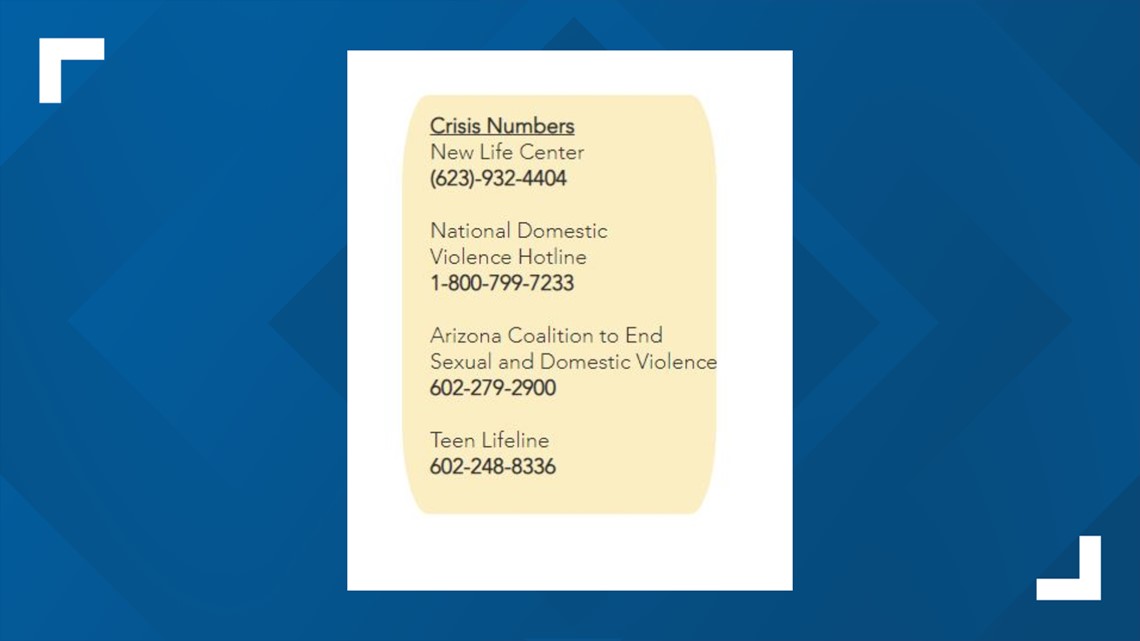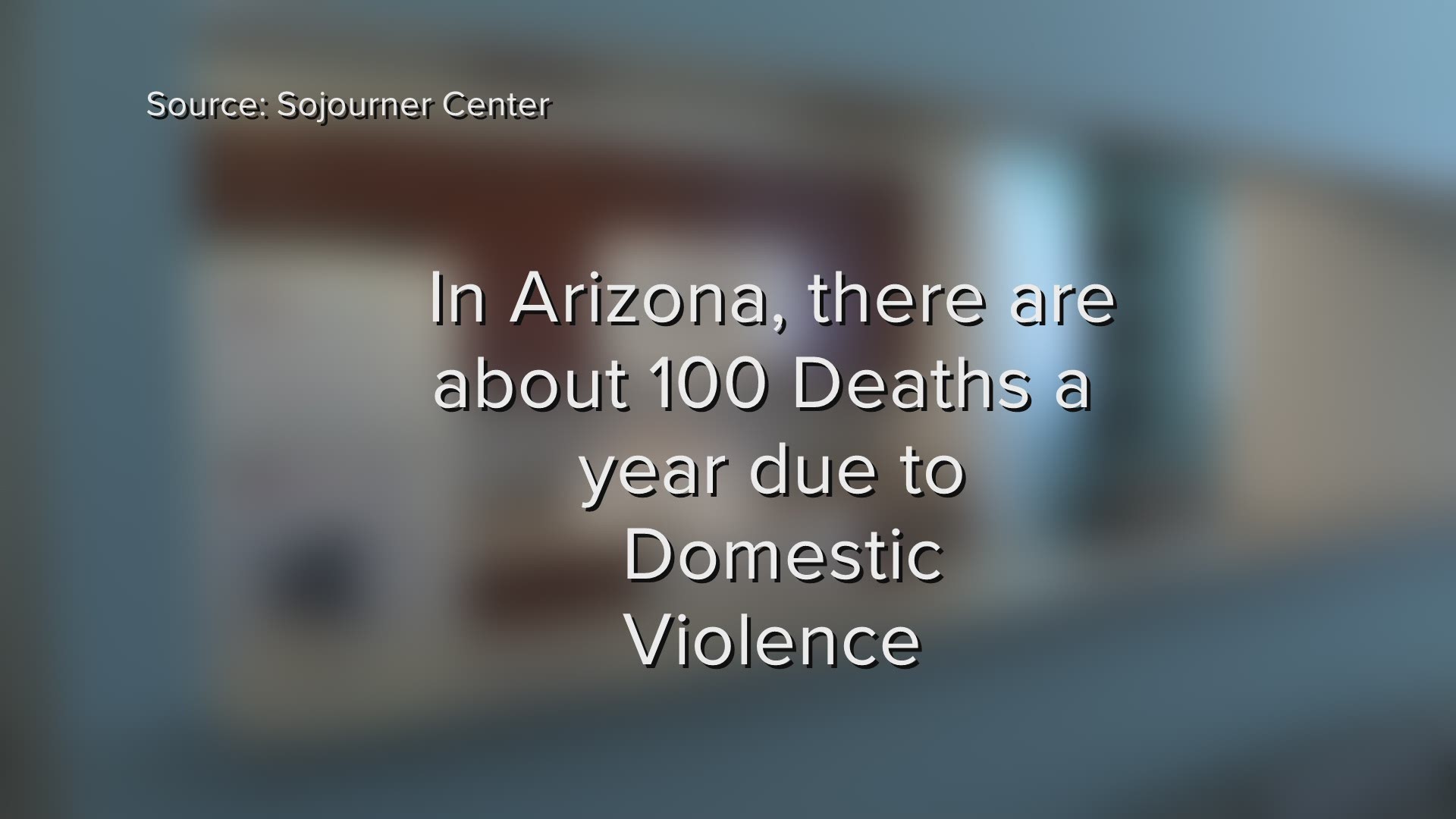Every year, it's estimated that 100 people die in Arizona as a result of domestic violence. National statistics show on average, 20 people per minute are physically abused by an intimate partner in the United States.
Now, with a stay-at-home order in place in Arizona to prevent the spread of COVID-19, many people are in potentially deadly situations sheltering in a home with an abuser.
With families sheltered at home, often in tight quarters, child abuse is also a rising concern for experts.
"Right now, the greatest concern along with domestic violence and sexual violence victims is child abuse victims," said Myriah Mhoon, CEO of New Life Center. "They don't have those lifelines like school, social workers, and after-school programs that are advocating for them, looking for signs and symptoms. So we are very concerned about our kiddos that are now again in this 24-hour isolation where their mom or dad is the perpetrator, or maybe grandma or uncle."
Mhoon is the CEO of the largest domestic violence shelter in the state, New Life Center or NLC. She said it is important for people in potentially abusive situations to know help is available 24 hours a day.
"The main thing that we want folks to advocate for victims that might be isolated with their perpetrator in the home is to make sure they have resources to reach – either law enforcement or a hotline for help," said Mhoon. "Our hotline is accessible 24/7 and we will help work on safety planning. That can include tools on how to get out of the home and into a shelter or to law enforcement."
She said safety planning can also be just tools of how to keep a person or the family safe while they're in the same home or environment with the perpetrator.
The National Domestic Violence Hotline said the stress from the COVID-19 pandemic could make an abuser even more aggressive.
Abuse is about power and control, so when an abuser feels less control over things like finances and working remotely, the abuser may take advantage of the situation to gain even more control.
"It's like walking on eggshells on a normal day, so it would be like walking around holding a bomb in my hand," said Andrea, a domestic violence survivor. "Any little move I made set my ex-boyfriend off. Imagine being stuck with knowing any little thing you do could cause the bomb you're holding to explode. That was my life 24/7."
Andrea said she managed to get out of her situation several years ago, but it wasn't as simple as just deciding to leave. She had to plan it out, and she still lives life looking over her shoulder.
She said she fears for the lives of children and intimate partners in homes right now with abusers.
"If you are worried about someone, trust your gut and reach out to them," she said.
"I've been telling everyone, including even my staff, when you're working from home, when you're reaching out to a girlfriend, ask them to be on Zoom, ask them to be on the phone with you," said Mhoon. "We have to think outside of the box now when we're checking in on folks, and so far, my team doing Zooms, everyone has to be on camera. That's a safety kind of measurement."
Mhoon said to make sure the people look healthy and happy in their environment. She is encouraging people to do this with everyone in your life right now.
If you have an established relationship with a child in your community, Mhoon said you should check on the child and the whole family. She encourages people to be alert and aware, especially when it comes to children.
"[Children] can't advocate for themselves always," said Mhoon. "This is a grave concern as well as domestic violence. The pure isolation of the issue regarding domestic violence, sexual violence and child abuse is giving the advocacy community great concern."
If you think someone in your life is in trouble and unsafe or you are the victim there are some step you can take.
"The first step is call a hotline like New Life Center. There, we will provide you with an expert advocate who will personalize tools to make sure that you are building a safety plan that is safe for yourself," said Mhoon, "That could include working with code words with a neighbor, making sure you have law enforcement contact, ensuring you have enough money, keys, and information and documents needed to flee."
Mhoon said the plans are personalized for each situation. "The best thing they can do if they are in a safe environment is to call our hotline or law enforcement if they are in great danger," Mhoon added.


The National Domestic Violence Hotline said there are several ways COVID-19 could impact violence between intimate partners:
- Abusive partners may withhold necessary items, such as hand sanitizer or disinfectants.
- Abusive partners may share misinformation about the pandemic to control or frighten survivors, or to prevent them from seeking appropriate medical attention if they have symptoms.
- Abusive partners may withhold insurance cards, threaten to cancel insurance, or prevent survivors from seeking medical attention if they need it.
- Programs that serve survivors may be significantly impacted –- shelters may be full or may even stop intakes altogether. Survivors may also fear entering shelter because of being in close quarters with groups of people.
- Survivors who are older or have chronic heart or lung conditions may be at increased risk in public places where they would typically get support, like shelters, counseling centers, or courthouses.
- Travel restrictions may impact a survivor’s escape or safety plan – it may not be safe for them to use public transportation or to fly.
- An abusive partner may feel more justified and escalate their isolation tactics.
You can find resources to help domestic violence victims in Arizona here.
If you or someone you know is in an abusive relationship, here are some resources available to you. Keep in mind your computer use or call history may be monitored. You may want to use a trusted friend's computer or a computer at a public library to navigate the sites below.
Once it's safe to do so, follow the links to learn more.
- Arizona Coalition to End Sexual and Domestic Violence: azcadv.org
Their helpline is open Monday through Friday, 8:30 a.m. to 5 p.m. at 602-279-2900 or 800-782-6400
- National Domestic Violence Hotline: 1-800-799-7233
- How to get a protection order in Maricopa County if you're a survivor of domestic violence: azlawhelp.org
- Here are the rules for obtaining a protection order in Arizona
- Find legal advocacy, emergency shelter and housing intervention services in Arizona for survivors of domestic violence: des.az.gov
- Where to take your pets if you are entering a domestic violence shelter: Arizona Humane Society Project Safehouse
Call 911 if you are in danger.
--
MORE STORIES:

